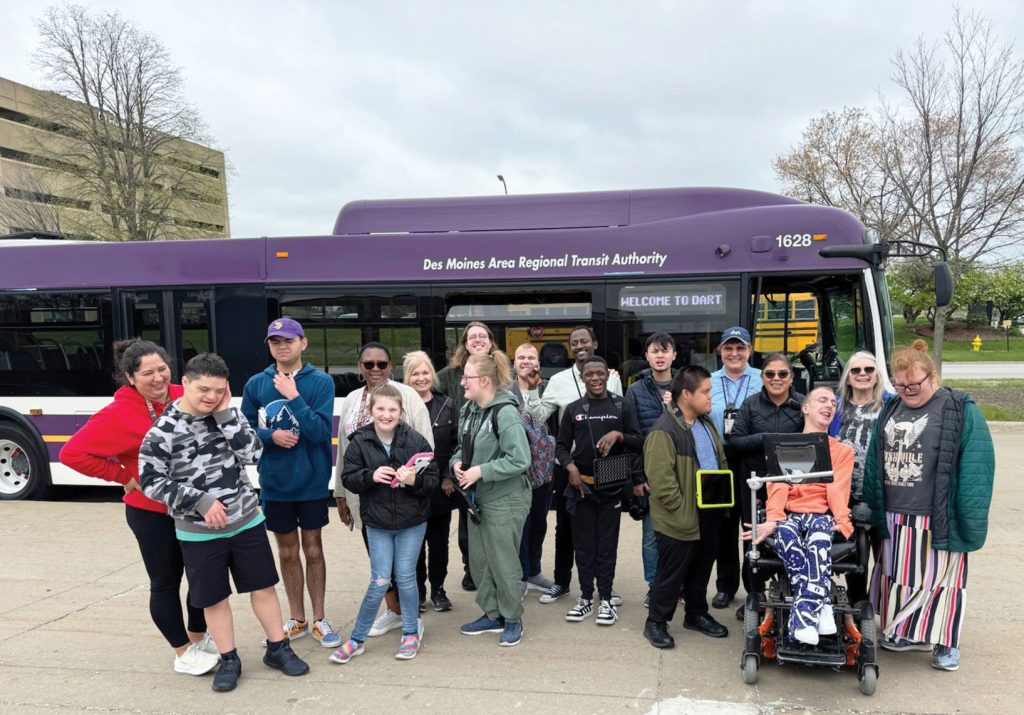Authentic Partnerships, Diverse Public Input
By Sarah Welch | 9/22/2025
Senior Marketing & Communications Manager
Des Moines Area Regional Transit Authority, IA

Hosting public meetings in specific neighborhoods. Translating surveys into multiple languages. Purchasing ads in niche media outlets. These are some of the tactics Des Moines Area Regional Transit Authority (DART) has tried—with limited success—to engage diverse populations in our public input opportunities.
When we embarked on an entire bus network redesign as a part of Reimagine DART, we knew we needed to expand our approach to ensure our plan was informed by individuals more likely to use public transit but who may have barriers to participating in public input opportunities. Instead of expecting them to have the time, resources, and ability to come to us, we needed to go to where they were—in addition to our typical engagement efforts.
Following a model set by other local groups, DART worked to form partnerships with some 15 community-based organizations that serve different populations, such as immigrants, refugees, low-income households, individuals with disabilities, and youth who experience homelessness. We recognized that these organizations were already spending time helping their clients use DART and had built trusting relationships with individuals we wanted to ensure we heard from. Using a private grant, we formalized the partnerships by offering stipends of $1,000 or $2,000 to help cover staff time, incentives, and other needs organizations may have in working with us—dollars we also offset by spending less on advertising or translation of certain materials.
The Result
Our public input opportunity in April set a record for the total number of survey responses, and the pool of respondents was more diverse, matching our overall population for the region and more closely aligning with our rider demographics.
Here are some key steps we took to implement this approach:
Time to build relationships: We identified different populations that are more likely to use our bus network and then approximately 20 agencies that serve those populations. DART staff met with each agency to give an overview of Reimagine DART and to get feedback on what strategies and materials would be helpful to reach the populations they serve.
These meetings started to establish stronger working relationships, but we also needed time to ensure there was a mutual understanding of what we wanted to accomplish together. Additional communication helped solidify who had the capacity to partner or where we first needed to build deeper trust. We especially acknowledged that we were asking organizations to focus on a future planning effort at a time when they and their clients were facing significant uncertainty and had immediate needs to address.
Make it easy to participate: Providing a stipend helped demonstrate our desire to partner with organizations in a way that supported them. Also important was making sure receiving the funds was easy, as many organizations were already stretched doing their daily work. We sent a letter outlining our expectations for the partnership, which included receiving at least 25 survey responses from those they served in exchange for the stipend. The only reporting requirement was that they send us a summary email of what they did to engage their networks and how many people they estimated took the survey.
Provide resources and support: We used feedback from our initial meetings to develop materials and talking points that organizations could use to explain the topic and help their clients take the survey. Partners were also invited to a presentation to learn about the topic before we engaged the broader community. We hand-delivered promotional materials and surveys and attended meetings with their clients to present information that they then interpreted into other languages.
Outcomes
When we released our proposed new bus network for a second round of public input in early September, we felt more confident that we were presenting new bus routes and services based on the region’s priorities. While we have more work to do to deepen our relationships with diverse communities, we have found the approach of partnering with community-based organizations to be an effective strategy. A few of our partners shared similar sentiments:
“The process worked well for us. The $1,000 stipend, which compensates the partnering agencies for their time, is much needed and valued and I would encourage DART to continue offering these stipends.”
“Thank you for letting [us] be a part of this new adventure for DART and the community. We appreciate our partnership and value what DART brings to our community and to the residents of [our organization]. It is a valuable service for our community.”